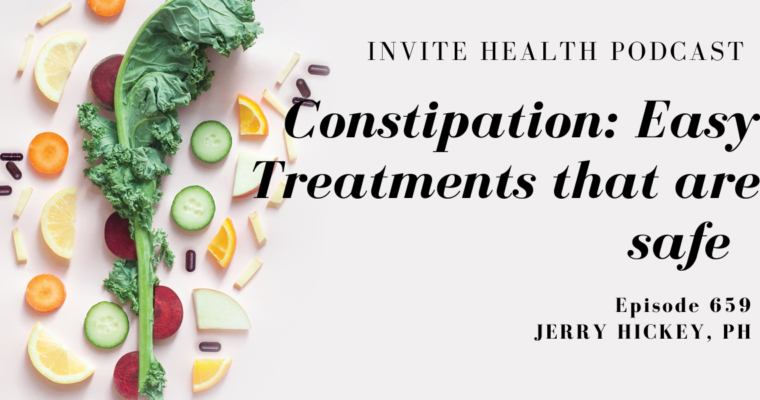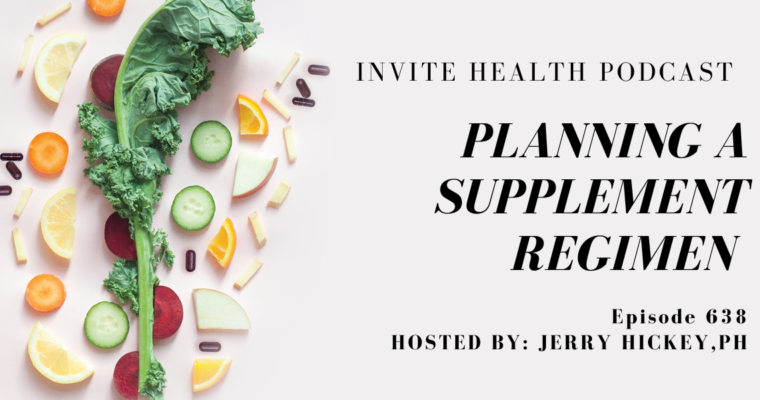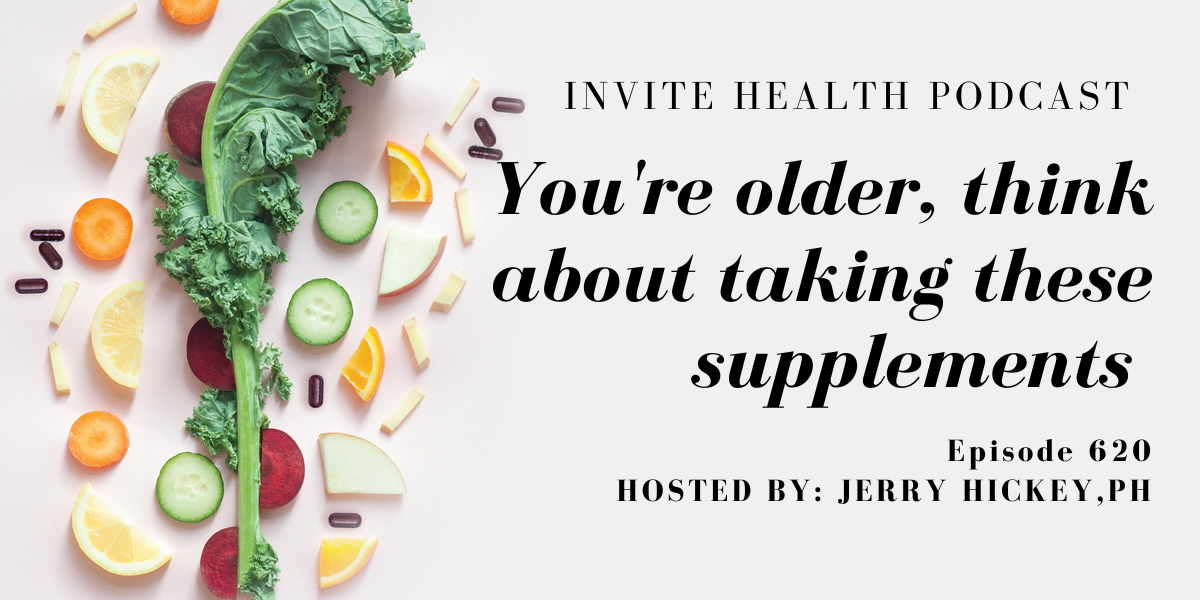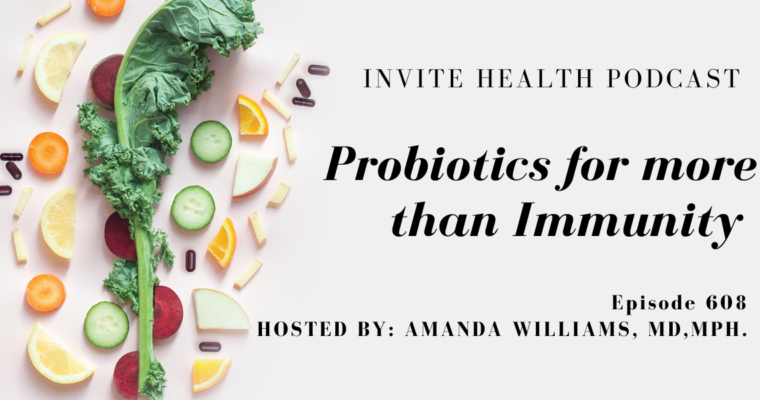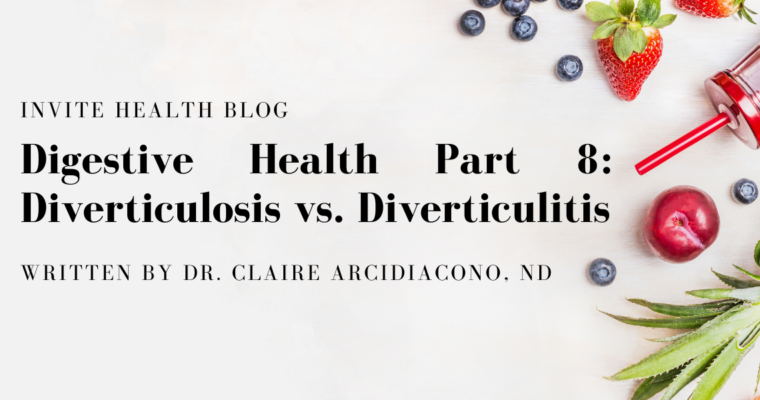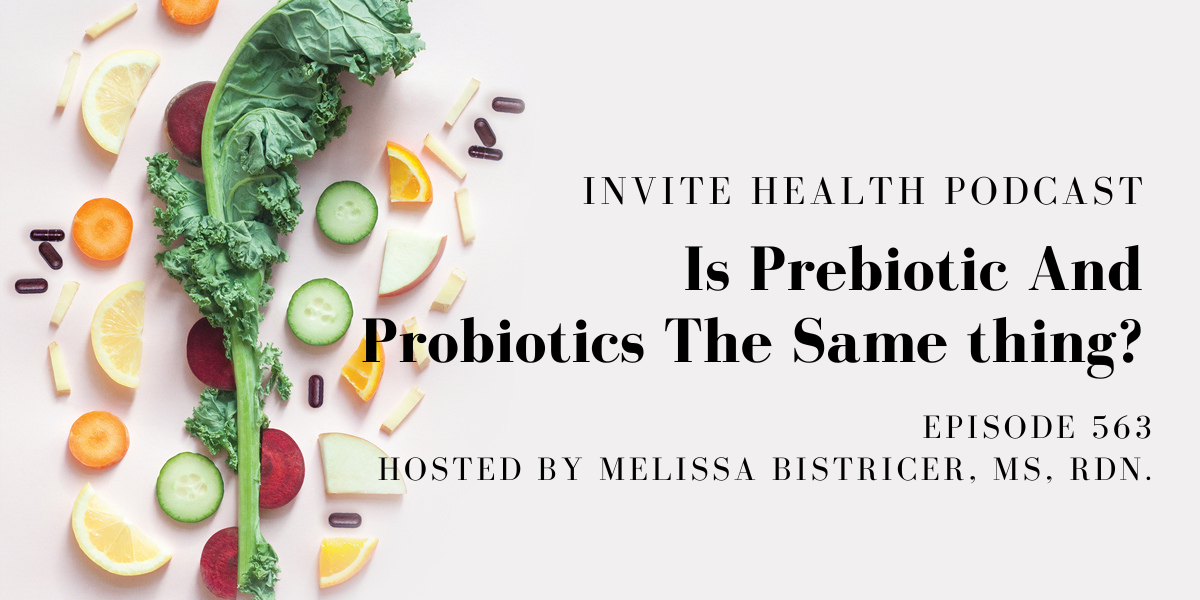Subscribe Today!
Please see below for a complete transcript of this episode.
YOU’RE OLDER, THINK ABOUT TAKING THESE SUPPLEMENTS – INVITEⓇ HEALTH PODCAST, EPISODE 620
Hosted by Jerry Hickey, Ph.

*Intro Music*
InViteⓇ Health Podcast Intro: [00:00:04] Welcome to the InViteⓇ Health Podcast, where our degreed health care professionals are excited to offer you the most important health and wellness information you need to make informed choices about your health. You can learn more about the products discussed in each of these episodes and all that Invite Health has to offer at www.invitehealth.com/podcast. First time customers can use promo code podcast at checkout for an additional 15% off your first purchase. Let’s get started.† [00:00:34]
*Intro Music*
Jerry Hickey, Ph.: [00:00:41] I’ve never done a podcast on my opinion as to what an older person should take, and it’s an important thing for me to do. I’ve been studying nutrition for decades, since the 1970s. I’ve been a licensed pharmacist since the 1970s, so I’ve covered a lot of territory. So I think that it would serve well to tell you supplements, I believe, are very important for older people. There are certain things that become harder for us to absorb from our food, so we need to make sure we’re supplementing with some of that at least. There are other things that we need to have more of, and there are other things that help slow the aging process. Now, over the course of this episode, I’m not going to get into disease states like people with diabetes need certain nutrients. People arthritic, need certain nutrients, help them. People with severe memory loss, there’s some nutrients that can be helpful. We’re not doing that. We’re talking about the general population. What can serve the general population as my policy if I could dictate policy for the general population. So welcome to my podcast. You’re older, think about taking these supplements. Hi, my name is Jerry Hickey, I’m a licensed pharmacist. I’m a senior scientific officer over here at InViteⓇ Health. I’ve also done a tremendous amount of studying of nutrition at school, etc. Welcome to this website episode. Welcome to this episode. In any event, you can find all of the invite episodes wherever you listen to podcasts and it’s for free. Or just go to invitehealth.com/podcast. You can also find Invite on Facebook, Twitter and Instagram at Invite Health. And all the information pertaining to the description of this episode will be listed, you know, in the episode description. So I really want to discuss this. It’s interesting, it’s fun. You know, listen, there’s a lot of things important to slow the aging process. Last week I covered a study where taking fish oils, a 1000mg of EPA, DHA, those are the two essential fats in the fish oils, along with 2000 units of vitamin D in simple home exercises, helps forestall pre fragility, pre frailty syndrome, which is really important because that helps prevent you from falling and hurting yourself, etc. And it keeps you active and it keeps you social, keep you motivated and keeps your mind going, etc. Because when you become frail, all those diseases of aging are creeping into your life. So you might want to look at last week’s podcast, looking at how to prevent pre frailty. If you prevent pre frailty, you prevent frailty, so that’s good.† [00:03:31]
[00:03:31] Exercise, essential. What’s better than exercise to forestall aging? A great diet, you know, three servings of vegetables, two servings of fruit every day, and getting enough protein, which is really important. We’ll go into that a little bit because the old information on how much an older person should consume for protein wasn’t enough. Not to mention that older people have trouble absorbing too much protein at one sitting, so they kind of have to space it out to really get the benefits of protein, we’ll go into that. Sleep, essential. You repair your bones when you sleep. It’s good for your immune system, it’s good for daily chronic pain, it’s good for your brain, it’s essential for your memory. I mean, it’s just so important. They’re all important to forestall aging, drinking, good quality water, try to avoid pollution. Pollution causes chronic low grade inflammation that’ll just destroy you. So if it’s possible, try to avoid pollution. I remember when I was young and I used to work in a pharmacy in Manhattan called Wilner Chemists. This was going back to like the 1970s. Everybody was jogging in the street at rush hour, and I’m like, this cannot be healthy. You’re breathing in all these fumes, an accelerated rate, an abundance of these fumes, because you’re inhaling so deeply, you’re destroying yourself with pollution. So try to avoid pollution, especially when you get older. It gets harder and harder to handle pollution because our available pool of antioxidants declines dramatically. And some of these antioxidants and enzyme system that are so powerful like superoxide dismutase and glutathione peroxidase and catalase. So you really want to try to help mitigate the effects of pollution by avoiding it, if possible. Not everybody can. One of the reasons I moved out of Manhattan to Suffolk County, Long Island, was to avoid pollution because I’m older now. Hey, I’m 69, you know, just I don’t want to be around the pollution.† [00:05:31]
[00:05:31] Okay. First supplement for older people. Let’s get to it. A multivitamin. It’s really important to have a high quality multivitamin. We have trouble absorbing things from our food, like Zinc and Zinc is so important to reduce inflammation or protect the brain and eyes. It’s important for our thyroid function, for metabolism, it’s important for the immune system, it’s important for controlling our blood sugar. It interacts with vitamin D and magnesium to control our blood sugar. So Zinc, we don’t absorb Zinc very well from our food. So don’t depend on your meals, in fact, most multivitamins have like 7 milligrams or 15 milligrams of Zinc. You really want to get a little bit more zinc than that. You want to give them upwards of 30 milligrams of Zinc if you’re older to really help the immune system function and to really help protect you. There’s an enzyme system in the brain. Zinc is essential to this enzyme system, superoxide dismutase enzyme system that protects your brain and other organs and tissues throughout the body. So a multivitamin, because you’re also not absorbing a lot of B vitamins as well as you used to, you’re not utilizing them as well as you used to. Like, there’s a number of studies that older people are low in B6, B12 folate. So let’s talk about B6, is important for the brain. Nothing functions well in the brain without B6, you need it to release neurotransmitters which make the brain work. But also B6 has been repeatedly connected with a lower risk of cancer such as colon cancer. These B vitamins are really important, you cannot create energy out of food without B-vitamins. Folate is a B vitamin, it’s named after foliage because it ubiquitous in foliage, but it’s hard to absorb out of vegetables and salads, etc. So multivitamins add folic acid. Now that’s the cheap way to go about it. Folic acid is synthetic. The problem is not everybody can convert it to the active molecule, which is methyltetrahydrafolate. And that’s a problem because methyltetrahydrafolate, first of all, reduces something called homocysteine. Homocysteine is natural to the body. It’s a metabolite of protein metabolism and low levels are fine. Everybody has low levels. It’s just one of those things. But if you can’t clear it out and it gets in excess, destroys your brain, it’s involved with depression, anxiety, but it’s involved with Alzheimer’s and the heart, if there’s other risk factors, not on its own, but if there’s other risk factors, it becomes toxic to the heart. It seems to weaken bones, but know the effects on the brain are really noteworthy because it’s, it is causative of Alzheimer’s. It’s one of the things that triggers an increased risk of Alzheimer’s. So get a multivitamin with the active form of folate called Methyltetrahydrafolate. B12,you might want to get the methylcobalamin form of B12. It’s really important for the brain and for energy production, and it covers all the, it gets converted to all the various forms of vitamin B12 that the body uses. B3 is in a multivitamin, B3 is one of the best things for slowing the aging process. It could be called niacin or niacinamide, nicotinic acid or nicotinamide, but it’s converted all these different things that are like protective and create energy and help prevent cancer. It’s one of the strongest things for preventing cancer. You don’t need that much, but it slows the aging process dramatically. So take a multivitamin.† [00:08:46]
[00:08:48] Fish oils or Krill oil. I happen to eat fish, but I still take fish oils every day just to make sure you want a lot of fish oils in the system. In fact, I do it as Krill oil because Krill oil has an additional ingredient known as phosphatidylcholine, which is really good for your brain. It’s really good for your brain. So I take two Krill oil every morning with my breakfast, even though I eat fish like three times a week, which is a good amount of fish. And I’ll tell you something, a lot of older people are on statin drugs. Statin drugs lowered the amount of fish oils in the body. So you want to put it back in the body, you want to replete it, because it’s really important for your brain. It’s really important for your brain. Fish Oils are important to a degree for your bones. They’re very important for your muscles. They’re important for your heart. They’re incredibly essential for your eyes and your brain. So you want to either fish oils or phosphatidylcholine or Krill oil, which also has phosphatidylcholine in it, or eat a lot of fish, just eat a lot of high quality fish. Be careful with the fish from fresh waters because they can have a lot of those forever chemicals in them, like PCBs, etc.. So you know, the ocean fish. Ubiquinol, what’s that all about? Ubiquinol I think is essential for older people. Most people know of a supplement called Coenzyme Q10. It was discovered in Japan, 20th century. But a lot of research was done in the 1950, 60, 70, 80’s in Texas. So Texas is a hotbed of coenzyme Q10 research. And there’s a company down there called Kaneka Japanese Company in Texas, and they make Ubiquinol, which is the active version of coenzyme q10. So why do I say this? Certain people cannot convert Coq10, the commonly sold one, which is called Ubiquinol, but most labels just say coq10. You know, most people who are older have a real difficult time converting regular CoQ10 to the active version. And if you don’t convert it to the active version, you don’t get the benefits. And the benefits are anti- fatigue, improved endurance and stamina. It’s better for your strength and your exercise. It’s very protective for your heart. It’s incredibly protective for your heart. And to a degree, it’s protective for other organs also, such as your your kidneys and your pancreas. So I tell older people, get Ubiquinol not coq10, get the active version of ubiquinol, Kaneka,down in Texas makes it, it’s good product. I mean, it’s been shown to reduce the incidence of heart attacks in older people, even people with heart disease. So I mean yeah, you can’t ask for better than that right? But it’s good for fatigue in older people, lutein and zeaxanthin, lutein and zeaxanthin are found a little bit in egg yolk,in green leafy vegetables like spinach and lettuce and broccoli, and they’re great for your memory. You need them, they’re essential for your memory and they’re essential for your vision and protecting your eyes. The problem is it gets harder and harder to absorb these. These are pigments in the vegetables there and in the eggs. They’re also a little bit in pistachio nuts, but they get hard to absorb in older people and your levels drop it. It’s bad for your brain and bad for your eyes. I take it every day. Everything I’ve mentioned so far, a multivitamin with the active folate and that form of B12 and additional Zinc. I mentioned additional Zinc. I take additional zinc. I take the Krill oil every day. I take the Ubiquinol, I take lutein and zeaxanthin. So I’m talking also, I’m a user. Now, it depends on your diet with protein. So let’s go into that a little bit. Protein makes you, it’s the second most common ingredient in your body. Water is the most common ingredient then comes protein. And but protein also make you work, like enzymes can be made out of protein. Enzymes make the body work much more efficiently and effectively. Neurotransmitters in the brain, hormones such as insulin, they’re all made out of protein. So protein is really important for many, many reasons. The immune system depends on protein. The brain doesn’t function without protein, you can’t exercise without protein. I mean, it’s just essential. Your bones have a large protein content. So why am I talking about protein? The old standards for protein in older people were too low. And you know, they’re funny, now, people, especially if you’re more active like myself, like every day I’m walking four or five miles and I lift weights every other day and, you know, I do all these things. You need more protein and typical so, you know, I get a lot of protein and you have to space it out. See, older people have trouble utilizing too much protein at once. So like if you get 50 grams of protein in one meal, you’re only using 20 grams and you want a minimum like 60 or 80 grams a day. So I tell people to, you know, I good sources of protein and egg, chicken, fish, of course, red meat. But, you know, you got to be a little careful with red meat, beans and legumes like, you know, peas and lentils. So all the legumes, soy, that’s a legume, all those things have it. You have to have enough protein and you have to space it out when you’re older. So you may want to fill in the blanks if you’re not consuming enough protein or you need a little bit extra by taking a good, solid, well-made whey protein powder, choose an American Whey protein like when I when I seeked out whey protein for my for my company InVite Health, I made sure I got an American source. You know what the Chinese source, some of them are a little tainted with things and many of them are low in the peptides. So you kind of want an American Whey. Whey, is it like a perfect protein, it has the essential, it has the conditionally essential amino acids as a branch and amino acid, a very good protein and it tastes good. So now there is a specific form of protein called collagen, it makes up about, I think, 30% of your body, collagen. It’s it is the protein in your body, is the most abundant protein in your body. So you can actually get a high quality collagen again don’t get the Chinese collagen. Listen, nothing against China. I’d love to go visit there. I love to go to China. I would love to go to Hong Kong, I would love to see China. All those national parks in China, all those temples. I mean, just amazing history, geography and nature over there. But I don’t really use some of their supplements because their controls aren’t tight enough. So I sadly, I banned ingredients from China in our supplements many, many decades ago. And it’s sad because, you know, I mean, you want people in China to have a job, too, right? But I mean, that’s the way it is. I think it’s Chinese. I have Chinese friends and I love high quality Chinese food. But if you get a collagen and you don’t want to get it from China because it could be very low in the collagen peptides, you want to get, like a good one is to Peptan B 5000, that comes from a French Italian company, that’s a good one. About 70% of your skin is collagen. About 36% of your bone is collagen. The collagen in your joints, like in your knee joint. 76% is collagen culture. It makes up to a degree your menisci, that cushion your knees and your jaw, your hair, your skin, your nails. I mean, it’s just, your spinal tissue and yet it’s just all over the body. It’s a barrier that helps protect the brain. It’s in that blood brain barrier that keeps toxins out of brain. It helps create your blood vessel walls and the valves in your heart, your nose and your ears and all that. I mean you just want enough collagen and collagen production, its something we make declines greatly once we stop growing. So I tell people, even if you like 35, you might want to take a little bit of college in every day. You know, if you want to look nice and your nails to grow and your hair to look good. But I think by the time you’re 50,55, you should be supplementing with collagen, and I take it every day.† [00:16:37]
DID YOU KNOW HOW IMPORTANT DHA IS TO AN AGING BRAIN? – INVITE HEALTH PODCAST, EPISODE 484
[00:16:40] I do not take beta hydroxy beta methyl butyrate every day. I take it after I exercise I mixed collagen beta hydroxy beta methyl butyrate and creatine monohydrate together after I exercise, my muscle fibers have opened up, they get into my muscle, they build my muscles. So what is creatine monohydrate? It refurbishes the energy in your muscles and it’s very good for strength, endurance for strength and the beta hydroxy beta methyl butyrate is the most effective amino acid metabolite for building strength and muscle and and preventing the fatigue of the muscles. So I take that, I exercise in the gym every other day. So I’m taking it every other day and you take it after you workout, it gets into the muscles better. I’ll repeat that beta hydroxy beta methyl butyrate, collagen and creatine monohydrate. So those, you know, you don’t have to take those, but they’re good if you do because creatine is also good for your heart muscle and you know, your heart’s beating like typically 80 times a minute, like a hundred thousand times a day. So that’s millions and millions and millions of time each year. It needs the energy, but creatine also gets into the brain. So if you’re vegan, creatine actually is not just helpful for brain energy. It’s good for memory in vegans, but for the general population, it’s good for brain energy and that’s really important in older people. I read a study once, older people are inactive not because their body is tired, but because their brain is fatigued and creatine monohydrate is great for brain fatigue. That and a multivitamin. great for brain fatigue.† [00:18:10]
[00:18:13] Now let’s get into add ons, things that you don’t necessarily have to to have, but they’re very useful. A very well absorbed turmeric, a very well absorbed turmeric. There’s like three of them on the market. One of them is from Sabinsa, when they add the black pepper or bioperine to it to improve the absorption of the turmeric. Now you might call it curcumin, but curcumin is only one of the ingredients in turmeric is like 167 ingredients in turmeric, and a lot of them are really good for the brain, and the heart, lowers the risk of cancer. But turmeric is great for your brain. If you take turmeric in the morning with your breakfast, your memory will improve, like over the next 6 hours. There’s a good data on this and older people, but it also helps release brain derived neurtrophic factor. It is about five human clinical trials on that, using one of the turmeric studies that I market and brain derived neurotrophic factor is active in other parts of the body, like in the heart. It’s needed for repair and function, but in the brain it’s like a miracle. So young people, when they go on a deep sleep, delta waves sleep every night, they release brain derived neurotrophic factor and the seeds to creation, you take the progenitor cells or stromal stem cells and you convert them into neurons, you convert them into memory cells. And young people, when they go into deep sleep, delta wave sleep, non-REM sleep, that’s deep sleep. And it’s a pattern, you know, sleep is a pattern. So that’s why you want to sleep six, seven, 8 hours a night. You go through this pattern multiple times. When you go into the deep sleep pattern, your releasing this brain derived neurotrophic factor and young people can make 600, 700 new memory cells every night, which adds up. Think about that. But older people, the release of brain derived neurotrophic factor really declines. Zinc has been shown in some studies to help the release of brain derived neurotrophic factor, but I don’t think there’s enough research on that. But a well absorbed turmeric has been shown to absolutely help to release a brain derived neurotrophic factor. So it’s good for your memory. You create cognitive reserve, in other words, if there’s part of your brains that have been muddled with depression or maybe some of the plaques that are involved with dementia, you create new healthy tissue that hasn’t been stained with these things. You brain goes on working, that’s a good thing. So a good turmeric is great for the brain, a well absorbed turmeric.† [00:20:30]
[00:20:31] Resveratrol is great for the brain. Resveratrol is the most vasoactive supplement, which means it’s great for circulation in general, like to the legs and the heart and skin, etc. It’s great for circulation to the brain and circulation to the brain generally declines, you know, maybe 11% in most people. And that’s bad because the brain is super high, super highly active. I mean, it’s just a super high active organ. So for instance, your brain might only weigh several pounds, but it’ll grab 20% of the energy from each meal just to make it function, just to help it run. The problem is a circulation decline. The brain is getting less blood, it’s getting less oxygen, fewer nutrients, not a good thing, less fuel. So by taking resveratrol, you restore circulation to an aging brain. They did a study at the Max Planck Institute. Max Planck was a theoretical physicist, he worked on, you know, those quantum things, which is a totally confusing part of physics to me. I’ll never fully understand it, but I really try to grasp it. In any event, it’s over in Berlin, Germany, and they found out when they gave older people 200 milligrams of resveratrol every day over the course of six months they were doing these powerful brain imaging studies. They found that parts of the brain involved with memory were reverting back to a healthier phase, a younger phase, and they were like reaching out to each other, creating neural networks, creating connectivity. And they were working together. They were firing together, and memory improved and they saw the functional level MRIs, and they saw circulation improved. So over the course of six months, memory was getting restored. These people in their seventies and eighties, they were otherwise healthy people. So resveratrol is good, but does a second thing in a brain. It helps restore the health of the blood brain barrier, which is like additional insulation on the blood vessels in the brain to help prevent toxins from getting into the brain. You know, you get a toxin that you big toe, yeah, okay, maybe that’s a problem, maybe it isn’t. You get the same toxin in your brain, you’re dead. So the blood brain barrier tries to keep all these things out of the brain. Obviously, it’s not successful with marijuana. It’s not successful with alcohol, but it tries to keep bad things out of the brain and it gets leaky with age. Those things are getting into the brain that could cause chronic low grade inflammation in the brain. And there’s a problem because you have a lower abundance of amino acids in the brain. The available pool of antioxidants has declined in your fifties, is pretty much gone by the time you’re 65. So you want to keep the bad things out of your brain and that that resveratrol restores the health of the blood brain barrier. And that’s a really good thing because you’re blocking bad things, you’re getting into the brain. The other thing it does in the brain, it causes the release of Sirtuin one, which is a protein that’s kind of like a longevity protein. It’s involved with slowing down the aging process. It’s a survival protein, like if you’re starving, you release it and the helps you survived starvation and make your cells last longer while you’re not getting any fuel from your food so you can help survive to starvation. That’s what it is. But it’s been connected with a lower risk of cancers, heart disease, dementias, and it slows down a lot of the processes involved with aging. But it’s been shown to reinvigorate the brain. And like the great regulator of the brain, the hypothalamus, it’s connecting that with the anterior and posterior pituitary. So it’s regulating through that, the metabolism and the release of hormones in the body. So it’s kind of like restoring not just health to the brain, it’s restoring health to the body. So that’s really cool. So you want to do your resveratrol, you want to do a well, absorbed turmeric. Let me get back to fish oils or krill oil, especially Krill oil. I mentioned to you that because we’re talking about things that are really good for older people, Krill oil can make plasmalogens, now, I mentioned that the level of antioxidants that protect the brain has declined, the available pool of antioxidants in the brain like superoxide dismustase type one and three, in the brain is less of it. That’s very relevant to aging in the brain because things that before could muck about in the brain and, you know, these things would quench them and remove them before they damage brain cells. These things are become more abundant, more active in the brain because they’re not getting quenched by the antioxidants. So plasmalogens are kind of like a bulletproof vest on your brain cell, Krill makes plasmalogens, it creates it has choline as phosphatidylcholine and serine, and it has Fish Oils. And all these things combine to make a protective coating on the outside of your brain cell, your brain cell to protect your brain cells. So there’s additional benefits to these supplements. And let me just say two other things very quickly. These are add ons, they’re not essential, Quercitin, It’s a senolytic. When you’re young, you can pluck out kind of zombie cells in the brain and in body. Otherwise they are toxic to other cells and they damage them and it can even kill them. As you grow older, you lose this effect. There’s of course, technical name for that quercetin, it’s a senolytic, it restores the ability to pluck out the zombie cells before they’re toxic to your other cells. So that’s something that helps slow the aging process. And then the sulforaphane which you get in mostly broccoli and broccoli sprouts, sulforaphane helps pluck out progerian,I explained that last week in my podcast episode quickly. Progeria is a protein we all make, and when you’re young, you pluck it out. Because it accelerates aging. There’s a disease called progeria. And these you’ve seen this on TV, these little kids that look like they’re 80 years old, they’re only 12. They look like they’re 80. They already have heart failure or they already had a stroke. They already have diabetes and signs of dementia and weak bones, etc.. They their aging is super accelerated by this protein called progerian, they can’t get rid of it, so it builds up massively in their body. So their lifespan is typically 13 years old at the age of one their hair is already thinning. Can you imagine? So I’m not saying that Sulforaphane can help them. I mean, that’s a rather super advanced situation. But for you and me, progeria also builds up in us and it accelerates aging and sulforaphane helps pluck the progeria out of your body. So these are things that are really important for older people. But I said the must haves, a great multi with the active folate and the active B12, some additional zinc, fish oils or Krill, oil, Ubiquinol, lutein and zeaxanthin depending on your diet, protein. Those are really the essentials. You might want to get a little bit more vitamin D as you grow older, because you just need it. It’s harder to make vitamin D as you grow older, it’s harder to absorb it for food. So, you know, you might want to get a little extra zinc and vitamin D above and beyond what’s in your multivitamin.† [00:27:09]
ICYMI:AN ANTI-AGING HERB THAT HELPS PROTECT THE BRAIN – INVITE HEALTH PODCAST, EPISODE 572>>LISTEN NOW!
[00:27:11] One other thing, and this is important. You should take a good probiotic from time to time. Research shows that the aging process kills off a lot of your good bacteria, and the bad bacteria become more abundant. When I say bad bacteria, some of them are very bad actors that if they get out of hand, they can cause infections. But others just cause chronic low grade inflammation, which accelerates the aging process. It’s not something you want. Good bacteria are essential for your immune system. They’re essential for good digestion. They’re essential for brain, proper brain function and healthy brain. I mean, they do many, many, many things. It’s not just about digestion, it’s not just about digestion. They even help regulate your appetite. So they help prevent allergies. I mean, they do a lot of good things. So you want to get a, a good probiotic and take it, You know, for the first couple of months, I would establish these bacteria. So let me give you a timeframe. And then after that, so take it every day for the first like several months. And then after that you can take it every other day or every third day to keep them going. A lot of things kill off the good bacteria like like a lot of cleaning fluids. So if you’re doing a lot of cleaning and spraying with things like fantastik, it kills off the good bacteria. If you have diabetes, it kills off the good bacteria. The aging process itself kills off the good bacteria, studies on millions of people proving this. So there’s a lot of things to kill off your good bacteria, a lot of drugs commonly use drugs, especially antibiotics, smoking, drinking alcohol, junk food. Because there’s nothing for the good bacteria to eat. They need to eat certain things to survive. And that’s found in like fiber rich foods, which are the healthier foods. So if you’re eating like a poor diet, you bet your bad bacteria probably have taken over because your good bacteria are not in abundance. So you take a good probiotic and here’s a timeline. Within the first three weeks, it really will be fantastic for improving your digestion. Within the first two weeks, it’ll help improve your immune system and after several months it’ll help with allergies. So that’s a good timeline. In any event, thanks for listening to today’s podcast episode. My name is Jerry Hickey, a nutritional pharmacist, Chief Scientific Officer over here. You can find all of the Invite podcast episodes wherever you listen to podcasts for free, or just go to invithealth.com/podcast. You can also find Invite under the title Invite Health on Twitter and Instagram and Facebook. Thanks for listening to today’s podcast. Have a great day. This is Jerry Hickey signing off and I hope to see you next time in the next episode of the InViteⓇ Health Podcast.† [00:27:11]
*Exit Music*


